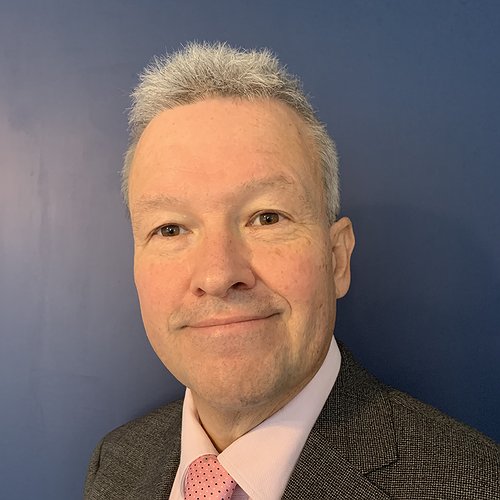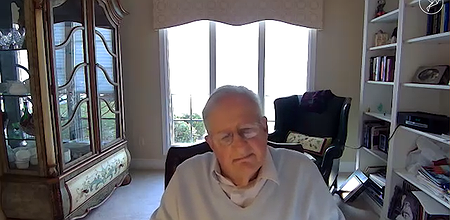- Understand the CFT-E model
- Understand the role of shame, self-criticism and fear of compassion in the development and maintenance of psychological distress, and specifically eating disorders
- Implement the CFT-E treatment model.
Treating eating disorders and eating distress with Compassion Focused Therapy
Dr. Kenneth Goss, Consultant Clinical Psychologist
Therapeutic toolkit with proven strategies and compassionate techniques for long-lasting change
Excerpt:
- 5h of continuing education
- 32 lessons that last from 5 to 15 minutes each
- 1 certificate of achievement
- 1 PowerPoint
- 1 bibliography
- 1 course evaluation
- 7-day money back guarantee
- Unlimited access
- 70% of participants who completed the satisfaction survey declare they would recommend this course to a colleague
Overview
The emotional and psychological complexity of eating disorders make these conditions particularly challenging to treat. They are frequently associated with profound feelings of shame, guilt, and self-criticism, which not only cause but also maintain the psychological distress of our clients.
But that’s not all ; these feelings can also severely impact their recovery process by hindering positive affiliative emotions and complicating the therapeutic relationship.
To help you with these challenges, Dr. Goss has developed Compassion-Focused Therapy for Eating Disorders (CFT-E). In this in-depth workshop, you will explore the CFT-E model and its application in each phase to support your clients on their path to healing.
Dr. Goss will guide you through CFT-E, a structured approach designed to effectively support your clients in taking control of their disordered eating patterns and addressing the underlying behavioral and cognitive processes. You will gain valuable insights into specific techniques and key treatment tasks that can make a real difference in your clients’ lives, from managing disordered thoughts, feelings, and behaviors to regulating emotions and boosting compassionate motivation. Dr. Goss will outline the fears, blocks, and resistances that clients often face during treatment. You will also have all the essential knowledge to grasp the complex biopsychosocial factors that contribute to the development and persistence of eating disorders.
This training will delve deeper into:
- The need for compassion in eating disorders/eating distress
- Shame, guilt, self-criticism related to eating disorders/eating distress
- Types of affect regulator systems in eating disorders/eating distress
- The Three Circles and its relevance in eating disorders/eating distress
- Applying to CFT in the treatment of eating disorder /eating distress treatment
- A Compassionate model for understanding how Eating Disorders develop
- An overview of the CFT-E model and introduction to CFT-E formulation
- The use of CFT-E programs, including its application with carers,
- The four distinct phases of CFT-E: psycho-education and motivational enhancement, developing compassion Skills, recovery, and maintenance
- Treatment outcomes and recent developments in CFT-E
In this workshop, Dr. Goss will also examine how this transdiagnostic approach can address a wide range of eating disorder diagnoses and overeating linked to emotional distress. This training is more than just a lecture – it’s an interactive experience enriched with role plays, case discussions, and reflections on integrating CFT-E into your clinical practice. You’ll walk away with a therapeutic toolkit packed with proven strategies and compassionate techniques that can lead to lasting change for your clients. Don’t miss out on this opportunity to transform your approach to treating eating disorders !
Accreditation
Collège des médecins du Québec
For physicians who practice psychotherapy, training recognized by the Ordre des psychologues du Québec is automatically considered as activities adopted by the Collège des médecins, in accordance with Article 3 of the Regulation.
For physicians who do not practice psychotherapy, the College evaluates each recognition request based on the following criteria:
- the relevance of the activity to the practice of the profession
- the skills and experience of the trainer
- the quality of the content and its adequacy with the physician's practice
- the pedagogical framework of the activity
- the quality of the documentation provided
- compliance with the training objectives set out in the regulation
- the presence of a certificate of participation or an evaluation
About the expert

Dr Ken Goss, psychologist, is a Consultant Clinical Psychologist with over 30 years of experience working with people with eating difficulties. He has published numerous academic papers and book chapters on the role of shame and compassion in eating disorders.
He leads an ongoing research program exploring these issues and their relationship with therapeutic practice and outcomes. He was the Course Director of the Birmingham University Post Graduate Diploma training course in Compassion Focused Therapy (CFT). He has worked closely with Professor Paul Gilbert, the originator of Compassion Focused Therapy and pioneered the use of Compassion Focused Therapy for Eating Disorders (CFT-E).
He is the author of the first book on CFT for disordered eating, “The Compassionate Mind-Guide to Ending Overeating” (New Harbinger Publications, 2011), currently under evaluation for its clinical efficacy as a guided self-help program.
Learning objectives
Learning material
A theoretical course illustrated with clinical examples. This course is composed of videos of 5 to 15 minutes each. The PowerPoint of the course to download.
Syllabus
- PowerPoint
- 1. Introduction
-
Understanding Eating Disorders and Compassion
- 2. Need for Compassion in ED-Edis
- 3. Drop Outs and Treatment Failures
- 4. Eating Disorders & Shame Research
-
Clinical Insights and Affect Regulation
- 5. Clinical Reflections 1
- 6. Types of Affect Regulator Systems in Eating Disorders
- 7. Clinical Reflections 2
- 8. Obesity Shame and Self Compassion
- 9. Clinical Reflections 3
- 10. Clinical Reflections 4
- 11. Some difficulties
- 12. Clinical Reflections 5
-
The Satiety System and Reflections
- 13. Satiety system part 1
- 14. Satiety system part 2
- 15. Clinical Reflections 6
-
Compassionate Models and Consequences
- 16. A Compassionate Model for Understanding How Eating Disorders Develop
- 17. Clinical Reflections 7
- 18. Unintended Consequences
- 19. Clinical Reflection 8
-
The Compassion Focused Therapy for Eating Disorders (CFT-E)
- 20. The CFT-E Model
- 21. The CFT-E Program
- 22. Low Weight Obesity and CFT
-
Advanced CFT-E2 Framework
- 23. CFT-E2 Model part 1
- 24. CFT-E2 Model part 2
- 25. CFT-E2 Developing Capacity
- 26. Stages of CFT-E2
- 27. CFT-E2 Psycho-education
-
CFT-E2 Skills and Recovery
- 28. CFT-E2 Skills session 1 to 6
- 29. CFT-E2 Skills session 7 to 12
- 30. CFT-E2 Recovery
- 31. CFT-E2 Outcomes
- 32. Conclusion
- Bibliography
CE Credits
Download a certificate of successful completion.
Audience
This training is intended for mental health professionals.
Your comments
"The only critique or suggestion I have is that the trainer`s voice is quite monotomous at times." (automatically translated)
A psychotherapist (Canada)
Registration
Ask a question
Do you have a question? Then email us at contact@asadis.net
Frequently asked questions
-
Is there an evaluation at the end of the course?
To validate the achievement of the learning objectives, a final evaluation in the form of true/false questions is required. It must be completed in order to obtain the certificate of completion.
In addition, an optional self-assessment is offered at the beginning and end of the course, allowing you to measure your progress on the targeted skills.
These evaluations are not graded and are intended primarily to support your professional reflection.
-
I have a disability. Can I receive specific support?
Yes! This training is offered as a pre-recorded video format, without subtitles. If you have a disability, we can provide an adapted alternative (technical assistance for viewing or individual supervision). For any request, please contact our disability coordinator at the following address: contact@asadis.net
-
How long do I have access to the course?
After your registration, the course is accessible anytime and from anywhere with unlimited access.
-
When does the course start?
That is entirely up to you! When you buy a course, you'll receive an access link that you can activate when you want.
-
Is there a student rate?
Yes there is! To learn more, email us at contact@asadis.net.
Legal notice
The courses offered by ASADIS are accredited by different professional organisations. In addition, ASADIS is approved by the Canadian Psychological Association to offer continuing education for psychologists. ASADIS maintains responsibility for the program.
The CPA’s approval of an individual, group, or organization as a CE Sponsor or Provider is restricted to the activities described in the approved application or annual report form. The CPA’s approval does not extend to any other CE activity the Sponsor or Provider might offer. In granting its approval, the CPA assumes no legal or financial obligations to Sponsors, Providers, or to those individuals who might participate in a Sponsor or Provider’s CE activities or programs. Further, responsibility for the content, provision, and delivery of any CE activity approved by the CPA remains that of the CE Sponsor or Provider. The CPA disclaims all legal liability associated with the content, provision, and delivery of the approved CE activity.




